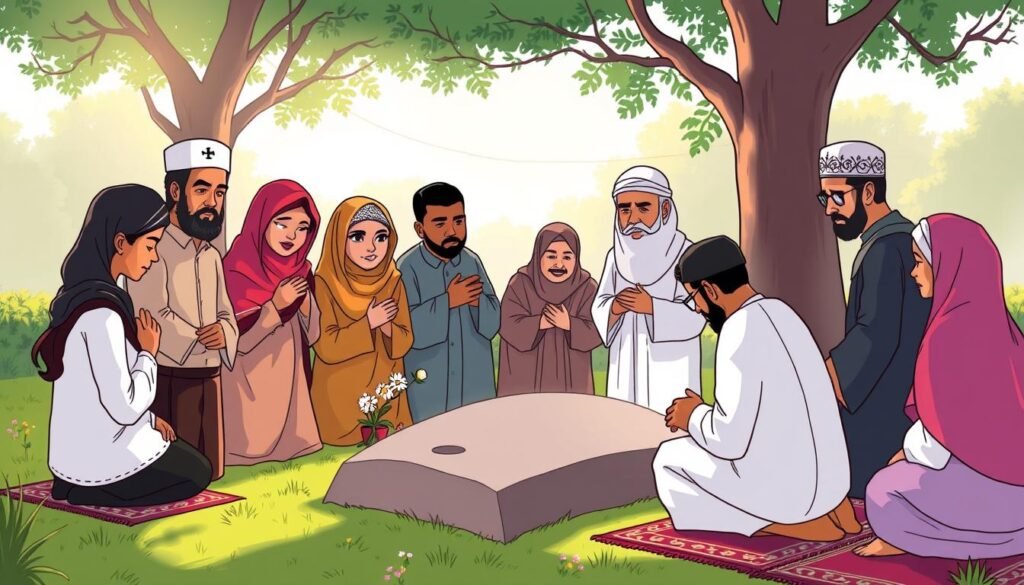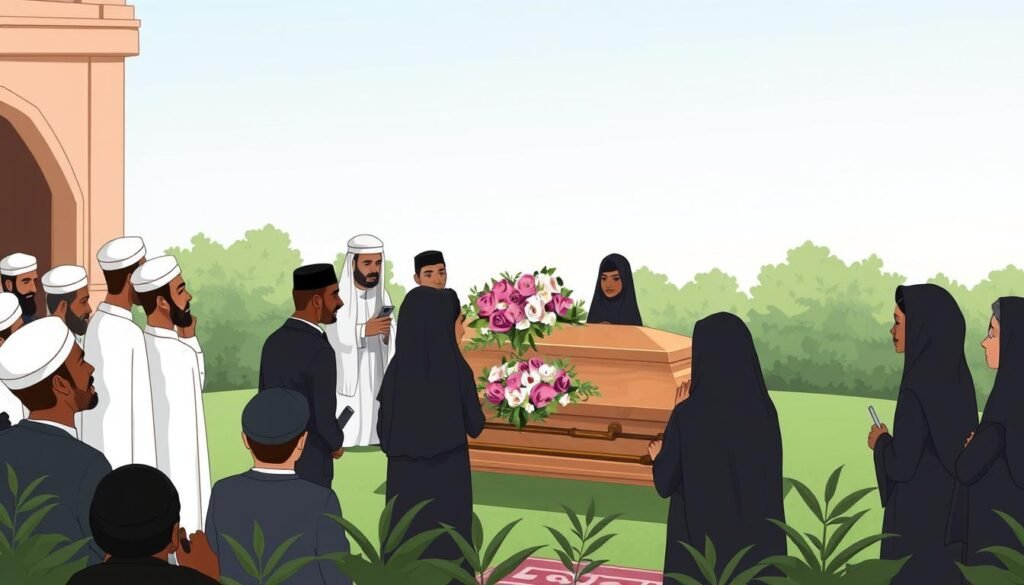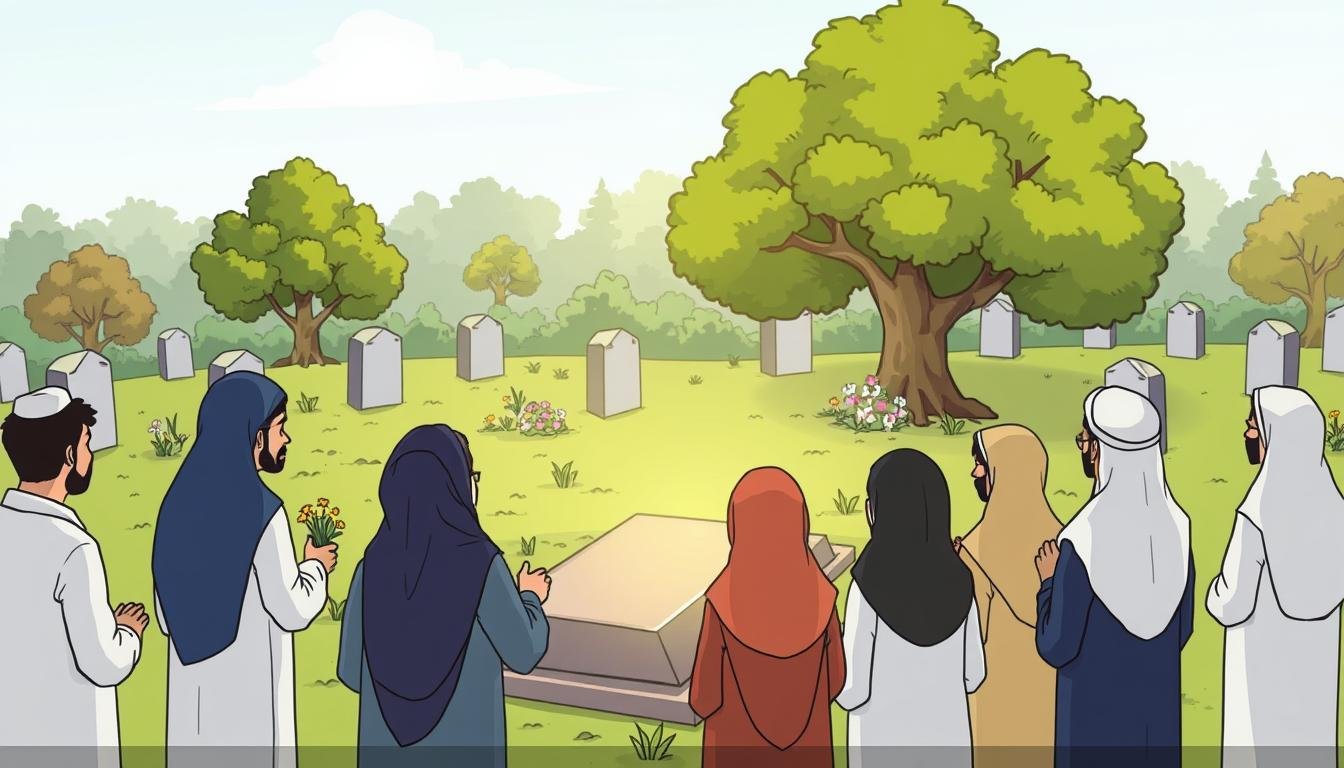When we face loss, many wonder if non-Muslims can attend a Muslim funeral. This question shows our care for death and our curiosity about faith connections. It might make us feel unsure or scared to join a funeral of a different faith.
But, learning about Muslim funeral customs can help us feel more welcome. As more non-Muslims join, it shows respect and support. It helps build stronger bonds between faiths, honoring the person who passed away and comforting those who are mourning.
Understanding Muslim Funeral Practices
To truly understand a Muslim funeral, knowing the Islamic customs is key. These customs show the importance of death and burial in Islam. A quick burial, usually within 24 hours, shows great respect for the person who has passed.
Washing and dressing the body in simple white cloth means purity and humility. The community’s role is big, showing that everyone grieves together. Salat al-Janazah, the funeral prayer, is very important. It asks for mercy for the person who has died, showing the community’s unity in mourning.
Burial practices are simple too. Instead of coffins, Muslims are wrapped in shrouds. This connects them to the earth and shows a natural return. The funeral is short, lasting 30 to 60 minutes. It focuses on prayer and remembering the person, without showing off.
The way Muslims bury and mourn shows they understand life is short. It helps them accept and reflect on life, which is unique to the Muslim community.
Cultural Importance of Muslim Funerals
Muslim funerals are very important in society. They show the cultural significance in Muslim funerals. These events are not just ceremonies. They are a time for reflection, community, and healing.
The community support during mourning is key. It lets people come together and share their grief. This helps everyone feel better emotionally.
The rituals in Islam remind us life is short. They make us think about our values and mortality. Islamic funerals happen quickly, often in 24 hours.
This quickness shows the importance of caring for the dead. It also brings the community together in support.
Traditionally, the rituals are simple and humble. They show death is a shared experience. This idea helps everyone feel connected and supports values like compassion and solidarity.
Mourning periods, often 40 days, give time for reflection. But, today’s society sometimes wants shorter times. This mix of old and new shows these customs are always relevant.
Can A Non Muslim Attend A Muslim Funeral
Non-Muslims can attend Muslim funerals and are often welcomed. It shows respect and solidarity with the family. It also helps bring people together, showing respect for Islamic traditions.
Muslims usually want everyone to join in during funerals. While only Muslims can say the funeral prayer, others can watch. This shows the community’s unity and respect for each other’s beliefs.

Women in Islam might not go to the burial. This is a cultural rule that guests should know. It’s important to wear modest clothes, like long shirts and skirts, to show respect.
What to Expect at a Muslim Funeral
Learning about a Muslim funeral can make non-Muslims feel more comfortable. The service is filled with respect and solemnity. It starts with washing and shrouding the body, a private moment for the family.
The funeral prayer is key, happening before the burial. People stand in rows, showing community support. Then, everyone walks to the gravesite together, a moment of unity.
Going to a Muslim funeral lets non-Muslims see new practices. It helps them understand Islamic beliefs better. The white shroud shows that life is about deeds, not things, highlighting community support.
Key Rituals in a Muslim Funeral
The Muslim funeral rites are very important in Islamic faith. They prepare the deceased for the afterlife. The first step is Ghusl, washing the body by relatives or community members.
This act cleanses the body. It’s a key step before the body is wrapped in a Kafan. The Kafan is a simple white cloth that shows humility and equality before God.
After washing and shrouding, the funeral prayer, or Janazah, is held. People gather to pray for the deceased. They ask for forgiveness and mercy.
This prayer reminds us of the bond in Islam. It shows how prayer can help the departed. The prayer often happens in mosques or community halls, where many can join.
The burial is very important in Islam. The body is buried in the ground or a simple casket, as allowed by laws. The body is placed with its face towards Mecca, showing submission to God.
After burial, an Imam or family member leads a prayer at the grave. This prayer connects the living with the departed.
Dress Code for Attendees
Going to a Muslim funeral means you need to know the dress code. It’s about wearing modest clothes to show respect. People should cover most of their body and avoid bright or casual clothes.
Modesty in Clothing
Men should wear dress pants and a long-sleeved shirt. Dark colors like black, gray, or navy blue are best. They show respect for the occasion.
Women should wear long skirts or loose pants with long sleeves. A headscarf is also good. It shows respect and follows cultural rules. Avoiding bold makeup and jewelry helps keep the mood serious.
Specific Attire for Men and Women
Men can wear simple suits without too many accessories. Their shoes should be formal or semi-formal. This matches their outfit well.
Women have more choices, but they should be modest. They can wear flats or low heels. Kids should also dress modestly, following the same rules.
It’s smart to wear shoes that are easy to take off. This is because you might need to remove your shoes inside.

Participation in the Funeral Prayer
Being part of the funeral prayer in Islam is very important. This prayer is said during the Janazah gathering. It asks for God’s mercy for the person who has passed away.
It’s not for the person who has died but for their peace and forgiveness. Men and women sit in separate rows. This shows respect and follows Islamic traditions.
Non-Muslims can also attend with respect. They can watch from the side or behind. This shows respect and helps everyone feel supported.
The funeral prayer brings the community together. It shows how we all grieve together. This strengthens our bonds with each other.
Grief and Mourning in Islam
Grief and mourning in Islam show a deep bond with community and culture. The way we mourn is guided by Islamic teachings. These teachings stress patience and remembering God’s plan for life and death.
Crying and showing sorrow are okay, but we must also accept God’s will. This balance brings comfort in hard times.
Cultural Variations in Grieving
Mourning in Islam varies by culture, each with its own customs. Some groups have special mourning times with gatherings to remember the lost ones. These events honor the deceased and help the community come together.
It’s important to respect these cultural differences. Doing so helps us care for each other during grief.
Islam teaches us to be kind to all, even those who believe differently. We are encouraged to attend funerals of non-Muslim relatives. This shows our respect for all people. Prophet Muhammad’s example teaches us to be kind, even in mourning.
Etiquette for Non-Muslim Attendees
Going to a Muslim funeral can be very meaningful. It’s important for non-Muslims to follow certain rules to show respect. They should be quiet during prayers and not take pictures. Respectful interaction with the family is key—keep greetings short and acknowledge their loss.
How you act is important too. It’s best to look serious to show you care. Women who are not Muslim can go, but they must dress modestly. This means wearing a long skirt and a headscarf.
Before you go inside, take off your shoes. This shows respect and keeps things clean. In Muslim funerals, people stand in line behind the coffin. Non-Muslims can watch but not join in. Knowing the right words and how to write them is also important. It shows you respect their culture. Simple actions can make a big difference in these special moments.
Conveying Condolences and Support
In Islam, visiting the family of the deceased is key. It shows we care and stand together. Saying “Inna lillahi wa inna ilayhi raji’un” helps us remember we all face death. It shows our support and reminds us of our shared humanity.
At funerals and later, we can offer emotional support. While flowers are not allowed, helping with meals or chores is very helpful. These actions show we are there for them and help ease their burden.
Our goal is more than just saying sorry. It’s about creating a space where those grieving feel understood and supported. By showing sympathy and helping out, we build a bridge of kindness. This connects us all, even in hard times.
FAQ
Can non-Muslims attend Muslim funerals?
What are the key Islamic funeral customs?
Why are Muslim funerals culturally significant?
What should non-Muslims know about attending a Muslim funeral?
What can I expect during a Muslim funeral service?
What are the fundamental rituals performed at a Muslim funeral?
What is the dress code for attendees at a Muslim funeral?
How can non-Muslims participate in the funeral prayer?
How is grief expressed within Islamic traditions?
What etiquette should non-Muslim attendees follow?
How should condolences be conveyed at a Muslim funeral?

Embracing Faith, One Insight at a Time!
The teachings of the Quran have always guided my path. With a deep passion for Islamic knowledge, I strive to blend the wisdom of tradition with the relevance of today, making the timeless messages of Islam accessible and meaningful for everyone.
Muslim Culture Hub is my platform to share historical insights and thought-provoking articles, exploring both well-known and lesser-discussed aspects of Islamic culture and beliefs. My mission is to create an inclusive online space where everyone can learn, strengthen their faith, and connect with the profound message of Islam.
Join the journey!
May peace be upon you.








